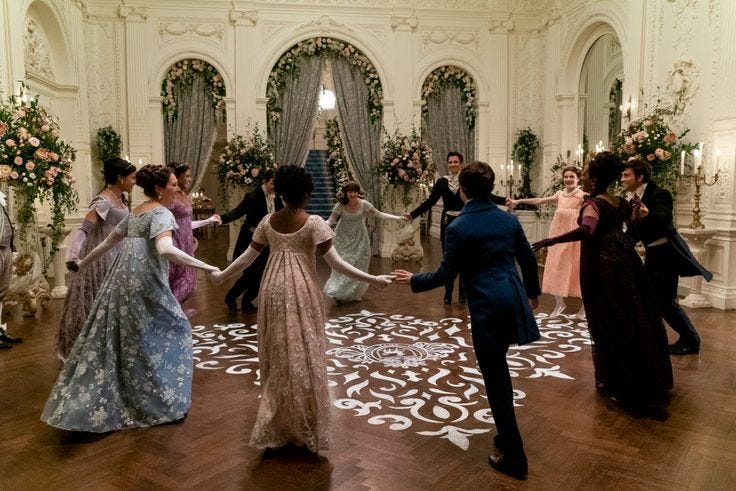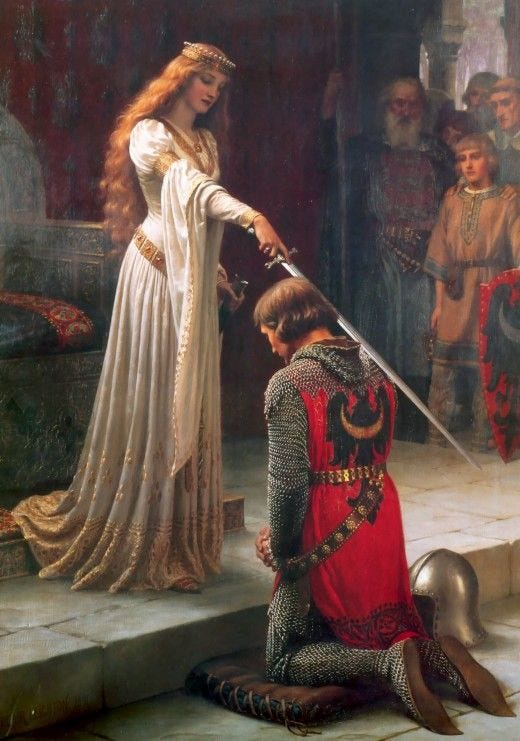i read bridgerton and now i'm depressed : a very opinionated book review and thoughts on historical nostalgia
After realizing that summer was coming to an end and I had still not read all eight books of Bridgerton by Julia Quinn (which I had put on my summer to-be-read list in may), I decided to make haste.
Therefore, I took the opportunity to spend the next four days immersed in the oh-so average love stories of the Bridgerton siblings. For my readers who have neither seen the Netflix show nor read the book series ; Bridgerton is a series of Regency romance novels, published between 2000 and 2006, in which we follow eight siblings (named in alphabetical order) searching for love. The books have since then been adapted into a TV show by Shondaland with a much more diverse cast (but I’ll come back to this in one paragraph or two).
There will be some spoilers.
TW: Rape
First and foremost, I would like to say that the books are known to be problematic. Apart from very typical misogynistic clichés - the aggressive and possessive male leads are always soooo overjoyed to find their manic pixie dream girls, that are soooooo not like the other girls - the books also deal with heavy topics such as marital rape, and assaults without ever really discussing them, the perpetrators always seem to have reasons and appear as victims which is absolutely crazy to me. Finally, the books are also painfully white. Although the historical setting explains this lack of diversity it is still disappointing and could have easily been avoided: the books being romantic fantasy and not historically accurate. It has now been made clear that the show is better than the book series (obviously not perfect, but I’ll redirect you to this video of Khadija Mbowe and other video essays on Bridgerton).
I’ll now dive into my overall thoughts on the series. I read the books in french so I can’t really comment on the writing of Julia Quinn but what still emerged was that it was pretty simple and not very regency-y (at least to the french me). The structure of the books and the plots felt so repetitive; a rake with daddy issues and a virgin kiss at page 180 (rising action), he “compromises” her around page 220 (climax) and they have to get married or her reputation will be ruined, then they find something to not be happy about - often the fact they don’t love each other *blink blink they actually do*- and voilà le denouement.
The characters weren’t really interesting to me, they were all mostly one-dimensional. I did however like the scenes in which Anthony stood out as a father figure to his siblings.
It is the same problem with the female characters who have the same personality: they are witty, audacious, and intelligent women who know how to shut up a man like real girlbosses (and yet they still lose their composure in front of the very assertive and dominant men).
Now, I cannot say that I did not enjoy all eight books otherwise I would have not continued reading (that is a lie, no matter how bad a book is I will hope for it to magically get better in the last ten pages). I like the setting since I’m a sucker for costumes and Regency decor and I’ll always like a series that follows the characters of the same universe. Moreover, listening to Wanna Be Yours violin version on repeat made the experience a little less insufferable (It helped me romanticize everything, even malaria).
I’ll now share my unwanted (very) short opinion on each book even though I forgot their plots. And I won’t rank them because they were almost all mediocre at best.
#1 - The Duke and I (2000)
I’m not a fan of the fake dating “trope” in books because it just is very idiotic to me (you will obviously fall in love duh) but I did like the banter between Daphne and Simon. I did like the drama to a certain extent but it seemed to me that Daphne was quite manipulative. This was really clear in the scene where she takes advantage of Simon, this was horrific, ruined the book, portrayed Daphne as the victim, and was simply horrific.
#2 The Viscount Who Loved Me (2000)
This book features my favorite characters Anthony and Kate, which I appreciated more than others. The torment that brought their conflicting feelings towards each other was great and the evolution from “enemies” to lovers didn’t feel too forced and precipitated. If Quinn had excluded the physical assaults (kicking Kate in the stomach, stomping on her hand…) this might have been a really good book. Regardless, it still felt very repetitive and similar to the first book (also the scene that led to them being forced into marriage was quite goofy).
#3 An Offer from a Gentleman (2001)
Coming out of nowhere Quinn wrote a Cinderella retelling in which the second eldest (and unhinged) sibling, Benedict was the main character. Unhinged as he spent 2 weeks trying to convince/blackmail Sophie, the love interest, to be his mistress. I think this book was average, although it was the most “original” plot of the series (ironic isn’t it ?).
#4 Romancing Mister Bridgerton (2002)
10 years after the first three books, it is now time for Colin Bridgerton to find love with his friend Penelope even though “he would never marry her” and would rather convince himself that she wasn’t in love with him because he didn’t want to deal with her feelings and the fact that they were unrequited.
I didn’t like Colin, obviously, he annoyed me and felt like the archetype of the man-child. His love didn’t seem genuine towards Penelope, it rather really felt like it came from his insecurities and his need to be put on a pedestal.
#5 To Sir Phillip, With Love (2003)
TW: suicide, depression
Many people hate Sir Phillip and this book but I did in fact, somehow like it. I liked the realness and desperation that consumed Sir Phillip after the suicide of his wife. And the hope Eloise had to find her person (even if her person was very entitled and had most of the time pretty sexist thoughts). I think Eloise and Phillip might have been the most interesting characters throughout the whole series.
There were also some really weird discussions around melancholia (depression) and happiness that sounded very selfish and insensitive. Although the books were the product of their times, it amazes me how Julia Quinn managed to write about subjects so insensitively in each of her book.
#6 When He Was Wicked (2004)
I honestly didn’t care much for this book. I didn’t like the plot: a man (Michael) pines after the wife of his cousin, the cousin dies and 4 years later they marry because the wife wants a baby. The book could have been really interesting if it had focused more on the fertility problems of Francesca and if she hadn’t compared both men in bed (wtf).
HOWEVER, I am very excited for their season in the Netflix show, I think gender-bending Michael was a great decision and a queer love story is very adequate to a romance with years of yearning for a love that seems impossible.
#7 It's In His Kiss (2005)
Loved it, I was really excited to read Hyacinth’s book since her character spoke to me and I found her relationship with Lady Danbury to be really wholesome. The main plot being a treasure hunt was really refreshing and set apart this book from all the others.
#8 On the Way to the Wedding (2006)
I hate Gregory, he was the worst male lead ever !! He was so immature and did not read like a 28-year-old grown man. It felt like he fell in love with someone just for the sake of it and because it was convenient. What he described as first as love just seemed very shallow and superficial and even after "falling out of love” he never addressed that. The book was full of drama and second-hand embarrassment (so much so that I had to listen to the audiobook since I was very reluctant to see where the plot was headed).
These historical romances were very simple, they didn’t have enough substance to make them interesting, and the romance wasn’t swoon-worthy. The premises were all too similar, the characters were dull and there were too many questionable and problematic scenes that could have been erased from the story without affecting it whatsoever.
Thus, these books being forgettable I did wonder why I still felt sad to let them go and felt melancholic and nostalgic about the Regency era. That that is when I found out about historical nostalgia, defined as responses generated from a time in history that the respondent did not experience directly, even a time before they were born.
When I visited Versailles and explored the Petit Trianon with my dear friend Noée in the spring of 2022 I said so many times that I wish I could have experienced life back then (without experiencing la guillotine and the lack of baths) although I do believe that if I had lived through the 18th century or earlier I would have been a peasant or a plouc (after all I am still Breton). The same thing happened while watching Bridgerton. I do think this type of thought somehow stems from being a privileged individual, as I am white. However I do believe that historical nostalgia is a feeling that most people have experienced at some point in their life, and I will solely justify this with the weird medieval girl tik toks that I have seen on my for you page.
Historical nostalgia as we can see, originates from consuming historical pieces and gaining knowledge of a period and its associated objects, which makes individuals feel that they have an understanding of what it was like to have been a part of them. This is fairly wrong since people and media, have the tendency to embellish an imaginary or at least reconstructed past.
“If the past is redesigned as a comfortable refuge, all its negative features must be removed. The past becomes better and simpler than the present (John Tosh).”
Moreover, collective history and memory have the habit of glossing over some dark events and offensive and discriminative thoughts that made up society during a specific period. For example, even if gothic architecture and castles are impressive and beautiful we often forget the labor and sacrifices behind their construction. I think these structures do a great job at showing the wide inequalities between social groups in these times.
Nostalgia in history is seen as negative, and rightfully so; as it distorts reality and idealizes the past. But so does nostalgia for your high school days. And it is perfectly healthy to long for something you cannot get back, but not so much when it affects your objectivity.
So do not worry, this bitter-sweet feeling you have while looking at Pre-Raphaelite paintings while Army Dreamers by Kate Bush is playing in the background won’t last when you realize it comes from imagination and idealized characters. And in case it does not stop, I encourage dressing in historically inaccurate dress, frolicking in the gardens of a castle, going to the seaside for your health, and take up new hobbies such as painting aquarelles, embroidering and botanic. (And watch this channel to gain more knowledge about the times you romanticize).
Chris Marchegiani, Ian Phau, C.M, I.P, Away from ‘Unified Nostalgia’: Conceptual Differences of Personal and Historical Nostalgia Appeals in Advertising
Tobias Becker, T.B (2022), History and Nostalgia: Historicizing a Multifaceted Emotion, 13 May


J'adore a quel point c'est complet sans pour autant partir dans des analyses loufoques, en plus tu abordes des sujets controversés. Bref c'est hyper intéressant !
RépondreSupprimer